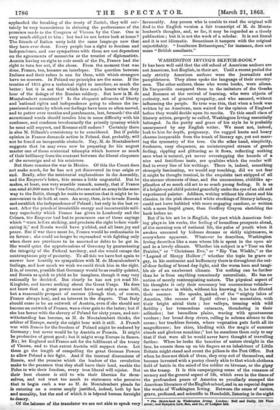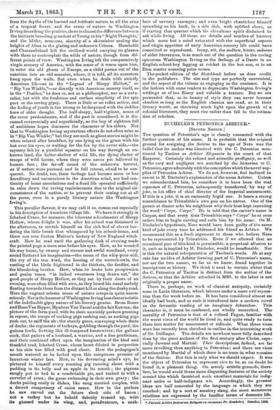WASHINGTON IRVING'S SKETCHBOOK.*
Ix has been well said that the old school of American authors are not American, but English, in their art. Until a recent period the only strictly American authors were the journalists and pamphkteers. They alone spoke the language of their country- men. The other authors, those who wrote books, were aliens. De Tocqueville compared them to the imitators of the Greeks and Romans at the revival of learning, who were objects of curiosity, not of general sympathy, and who amused, without influencing the people. So true was this, that when a book was written by an American, men waited for the opinion of England before they would decide upon its merits. To this small class of literary artists, properly so called, Washington Irving essentially belonged. In the purity and grace of his style he is probably unsurpassed by any English writer. We must not, indeed, look to him for depth, poignancy, the rugged knots and hoary charms inseparable from the trunk of literary age, yet not marr- ing the symmetry of the tree. On the other hand, simplicity, freshness, easy eloquence, an uninterrupted stream of gentle feeling, rippling and glittering as it flows, reflecting nothing save what is natural, yet never overstepping the bounds of a nice and fastidious taste, are qualities which the reader will find in every line of his writings. There is, indeed, something strangely fascinating, we would say touching, did we not fear- it might be thought ironical, in the exquisite tact stripped of all the sterner elements of time, and the unconscious, childlike ap- plication of so much old art to so much young feeling. It is as if a bright-eyed child painted gracefully under the eye of an old and experienced painter. Addison, writing without his claret and his classics, in the pink shoes and white stockings of literary infancy, could not have babbled with more engaging candour, or written with a more limpid grace, than Geoffrey Crayon sketching the book before us.
But if in his art he is English, the part which American feel- ing plays in his works, the feeling of boundless prospects ahead, of the morning sun of national life, the pulse of youth when it awakes unscared by hideous dreams or sickly nightmares, is everywhere apparent. Whatever he describes, Washington Irving describes like a man whose life is spent in the open air and in a lovely climate. Whether his subject is a" Tour on the Prairies," or "Christmas Eve," or "Rip Van Winkle," or the "Legend of Sleepy Hollow ;" whether the topic be grave or gay, in his sentiment and buffoonery there is throughout the out- of-door feeling of broad day-light, and the warm hum and tangi- ble air of an exuberant climate. Yet nothing can be further than he is from anything consciously naturalistic. He has no notion of merely contemplating nature. The physical aspect of his thoughts is only their necessary but unconscious vehicle— the rose-water in which, without his knowing it, he has diluted their essence. He speaks, indeed, of the "mighty lakes of America, like oceans of liquid silver ; her mountains, with their bright aerial tints ; her valleys, teeming with wild fertility ; her tremendous cataracts, thundering in their solitudes ; her boundless plains, waving with spontaneous verdure ; her broad deep rivers, rolling in solemn silence to the ocean ; her trackless forests, where vegetation puts forth all its magnificence ; her skies, kindling with the magic of summer clouds and glorious sunshine ;" but he mentions them only to say that if that were all he would never have thought of travelling further. When he looks the beauties of nature straight in the face, he counts them up on his fingers as an inhabitant of Little Britain might stand and count the pillars in the Post Office. But when he does not think of them, they crop out of themselves, and become invested with a poetry closely akin to that which clothes a field of battle in the mind of the soldier on bivouac, or the gipsy
on the tramp. It is this campaigning sense of the romance of scenery and the general aspect of life, which even in the times of
the profoundest peace of America so peculiarly stamped the American literature of the English school, and in an especial degree the works of Washington Irving. Between the sense of nature, grave, profound, and scientific in Humboldt, listening in the night * The Sketch-book fry Trashington Irving. London : Bell and Daldy, 186 Fleet street ; and Sampson Low, Son, and Co., 47 Ludgate lull. from the depths of his learned and intricate nature to all the cries of a tropical forest, and the sense of nature in Washington Irving describing the prairies, there is al most the difference between the intricate brooding grandeur of Young in his" Night Thoughts,' and the blithe, sensuous, alacrity of a skirmisher scaling the heights of Alma in the glaring and unknown Crimea. Humboldt and Chateaubriand left the civilized world carrying its glasses with them to contemplate the wilds of nature, though from dif- ferent points of view. Washington Irving left the comparatively virgin scenery of America, with the sense of it warm upon him, to enter the old gloom of Europe, as a child passes out of the sunshine into an old mansion, where, it is told, all its ancestors hang upon the walls. But even when he deals with strictly American life—as in the "Legend of Sleepy Hollow," or "Rip Van Winkle,"—or directly with American scenery itself, as in the "Prairies," he does so, not as a philosopher, nor as a natu- ralist, but with the freshness and surface simplicity of the epic poet or the roving gipsy. There is little or no reflex action, and the feeling of youth is too strong to be deepened with the sicklier hues of older thought. The half-sleepy, half-vigilant, sense of the rover predominates, and if the past is considered, it is dis- cussed reverentially and superficially, as the boy of eighteen full of ambitious hopes discusses the character of his elders. Not that in Washington Irving mysterious effects do not often arise as in "Rip Van Winkle;" but they are such as ghost stories might be when related after breakfast, by one lying on the grass with his bat over his eyes, or waiting for the fox by the cover side,—the mystery felt by a youthful squatter on his way through an un- known land, the helter-skelter of wild life, the dying clatter of troops of wild horses, where they were never yet followed by human foot ; the far-off sound of the unknown torrent, as if nature were pursued, and in full retreat, afraid to be con- quered. No doubt, too, these feelings had become more or less hereditary and unconscious in the American mind, nor had con- tinuity of home associations and a fixed life operated sufficiently to calm down the roving reminiscences due to the original cir- cumstances of the nation, or to prevent their oozing out at all the pores, even in a purely literary nature like Washington living's.
This peculiar flavour, if we may call it so, comes out especially in his description of American village life. We have it strongly in Ichabod Crane, for instance, the itinerant schoolmaster of Sleepy Hollow, whose delight it was, after his school was dismissed in the afternoon, to stretch himself on the rich bed of clover bor- dering the little brook that whimpered by his school-house, and there con over Cotton Mather's history of New England witch- craft. How he read until the gathering dusk of evening made the printed page a mere mist before his eyes. How, as he wended his way home, by swamp and stream and awful woodland, every sound fluttered his imagination—the moan of the whip-poor-will, the cry of the tree toad, the hooting of the screech-owls, the rustling of the birds frightened in the thickets, the fireflies, and the blundering beetles. How, when be broke into perspiration and psalm tunes, "in linked sweetness long drawn out," the good people of Sleepy Hollow, as they sat by their doors of an evening, were often filled with awe, as they heard his nasal melody floating towards them from the distant hill or along the dusky road. Here the vagrant solemn sense of nature creeps in quite uncon- sciously. Noris the humour of Washington Irving less characteristic of the indefinable gipsy nature of his literary genius. Brom Bones andHansVan Ripper, 34111:leer Van Tassel and the fairKatrina; the picture of the farm-yard, with its sleek unwieldy porkers grunting in repose, the troops of sucking pigs rushing out, as sucking pigs rush out, to sniff the air ; the stately geese, convoying whole fleets of ducks; the regiments of turkeys, gobbling through the yard; the guinea fowls, fretting like ill-tempered housewives ; the gallant cock, that pattern of a husband, a warrior, and a fine gentleman, and their combined effect upon the imagination of the kind and thankful toad, Ichabod Crane, whose heart dilated in proportion as his skin was filled with good cheer. How the pedagogue's mouth watered as he looked upon this sumptuous promise of luxurious winter fare. How, in his devouring mind's eye, he pictured to himself every roasting pig running about with a pudding in its belly and an apple in its mouth ; the pigeons snugly put to bed in a comfortable pie, and tucked in with a coverlet of crust ; the geese swimming in their own gravy ; the ducks pairing cosily in dishes, like snug married couples, with a decent competency of onion sauce. How in the porkers he saw carved out the future sleek side of bacon ; not a turkey but he beheld daintily trussed up, with its gizzard under its wing, and, peradventure, a neck- lace of savoury sausages ; and even bright chanticleer himself sprawling on his back, in a side dish, with uplifted claws, as if craving that quarter which his chivalrous spirit disdained to ask while living. All these are details and touches of humour which none but a mind saturated with the superficial aspects and virgin appetites of early American country life could have conceived or reproduced. Irony, wit, the mellow, bitter, sadness of older literatures, is as much out of the question in the roving epicurean Washington Irving as the feelings of a Dante in an English school-boy fagging at cricket in the hot sun, or in an Eton master scanning prize verses.
The pocket edition of the Sketchbook before us does credit to the publishers. The size and type are perfectly convenient, and the aspect of the volume as engaging as the contents. It is the fashion with some readers to depreciate Washington Irving's writings as of too flimsy and voluble a texture. But we are persuaded that, as in beauty of style they can never become obsolete so long as the English classics are read, so in their literary worth, as throwing much light upon the growth of a colonial literature, they must rise rather than fall in the estima- tion of scholars.































 Previous page
Previous page